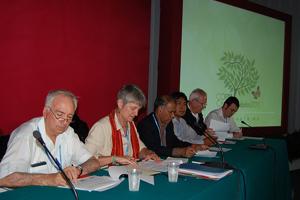
Faith communities came together to address climate change, poverty and sustainable development in a joint Caritas Internationalis, ACT Alliance and World Council of Churches side event to the Cancun climate summit on 7 December.
Credits: Alberto Arciniega/Caritas
Governments reached agreement at the climate conference in Cancun, Mexico on Saturday to curb climate change and provide funding for poor countries.
Caritas had been asking for deep and urgent cuts in greenhouse gas emissions led by developing countries and secure public finance for poor countries to adapt to climate change, all under a legally binding agreement.
Cancun delivered a lot less than Caritas had been arguing for to safeguard poor communities and future generations from the impact of global warming.
However, Caritas welcomes the deal as laying a platform for a legal binding agreement in future negotiations in South Africa next year. After the debacle at Copenhagen in 2009, Cancun shows that the UN process works and that it can deliver agreement.
Caritas Internationalis Director of Policy Martina Liebsch said, “The Cancun deal has set a spirit of seriousness and transparency which provided for a lifeline for future negotiations.”
Progress includes recognition of the need for an increase in the current emission reduction pledge to bring them to the levels recommended by experts to avoid dangerous climate change.
Developed countries will have to raise their existing average of 17 percent to between 25-40 percent based on 1990 levels by 2010. Although no deadline was attached, Caritas says global recognition that emission cuts must go further and loopholes closed is an important step forward.
The deal includes a ‘Green Climate Fund’ intended to raise and disburse $100bn a year by 2020 to protect poor nations against climate impacts and assist them with low-carbon development.
Secure financing to help developing countries adapt to climate change and to pursue sustainable development was a key ask of Caritas. There is still much to do on long-term finance, but at least the poorest now know that the outline of the fund is a reality.
Although the Cancun agreements recognise the need for global temperature rises to stay below 2C and to review the science on reducing that to 1.5C, the process of how to get there is unclear.
There was no agreement on a global long-term reduction target or a deadline for the peaking of global emissions, crucial milestones on the way to achieving the temperature target.
Please call Patrick Nicholson on +39 06 698 79 725 or +39 334 359 0700 or email [email protected] with any requests.
